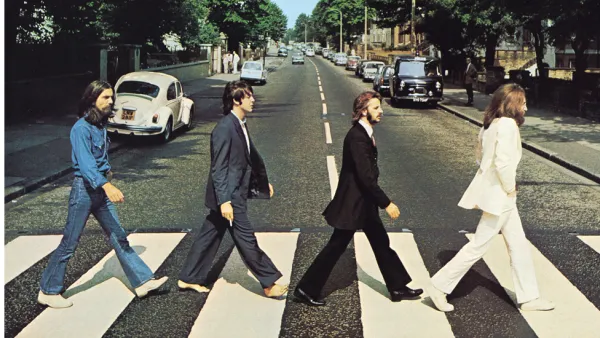Matthew Shipe is a senior lecturer in the Department of English.
Released September 26, 1969, Abbey Road stands as a glorious farewell to the Beatles’ recording career and to the decade that the Fab Four helped to define. The record, which is about to receive the deluxe treatment with a new stereo mix overseen by Giles (son of George) Martin and outtakes, remains a nearly perfect career finale, a deeply self-aware album that both commemorates the band’s ending while also maintaining a guarded optimism for what the future holds. While not the last Beatle album to be released — that would Let It Be, which appeared in April of 1970 as news of the band’s split became public — Abbey Road marked the final time John, Paul, George and Ringo would work together as a unit in the studio. Unlike the fragmentation that had defined their previous LP, 1968’s The White Album, Abbey Road captures a band thrilling in collaborating once again. The glorious harmonies of “Because” and “Sun King,” the joyous hand claps on “Here Comes the Sun,” the battling guitar solos and Ringo’s drum solo that propel “The End” all highlight a group that has, for at least a moment, fallen back in love with playing with one another. And while there might be better Beatle records — I’m partial to Rubber Soul and Revolver — Abbey Road might be the band’s most influential album as its sound — in particular, its use of Moog synthesizer and the medley that compromises almost the entirety of its second side — can be felt in the generations of bands that have followed the Beatles.
In many ways, Abbey Road endures as the group’s most mature record, a sensibility most keenly felt in the famous medley that constitutes the bulk of the record’s second side. “Boy, you gotta carry that weight/Carry that weight a long time,” McCartney warns in the medley’s penultimate song, the lyrics anticipating the difficulty that all four would soon experience as they attempted to carve out an artistic identity outside of the group. Indeed, a sense of uncertainty and even violence creeps into many of the songs’ lyrics. From Lennon’s enjoinder in the album opener “Come Together” to “shoot me,” a line partially obscured by McCartney’s bass line, to the jaunty but disturbing “Maxwell’s Silver Hammer” in which one “Maxwell Edison, majoring in medicine” goes on a killing spree, the violence of the late 1960s subtly makes its ways into the record’s margins. (A bit of a confession: as a Macca fan I’ve never quite understood the derision that “Maxwell” has received — I’ve always found it very funny. Bang! Bang!) Even the album’s most celebrated love song, Harrison’s “Something,” highlights the uncertainty of what the future might hold. “You’re asking me will my love grow,” George asks in that song’s bridge. “I don’t know, I don’t know.” Never has romantic doubt sounded so gloriously reassuring. (And try not humming that guitar solo; even Paul couldn’t help himself.)
Despite the doubt that creeps into the record, a sense of the Sixties’ dream quickly dissolving, Abbey Road stands as perhaps the Beatles’ most joyous and cohesive record. The tape cut that terminates the swirling guitars of Lennon’s “I Want You (She’s So Heavy),” bringing side one to an ominous close, is immediately resolved by the bright opening chords of “Here Comes the Sun” as Harrison reassures us that our “long cold lonely winter” has finally lifted. “One sweet dream came true today,” McCartney similarly rejoices in “You Never Give Me Your Money,” a song that reflects the tensions within the band while also celebrating his recent marriage to Linda Eastman. Although the Beatles would splinter within a few months of the record’s release and the potential of Woodstock would dissolve into the violence of Altamont, the promise of Abbey Road continues to resonate. McCartney’s closing lines to the side two medley — “And in the end/the love you take/Is equal to the love you make” — remain a perfect coda both for the band and the era it is tethered to. However, the record’s spirit of moving forward in the face of the unknown — “step on the gas and wipe that tear away” — continues to reverberate, making it the perfect record to spin in our own uncertain times.




